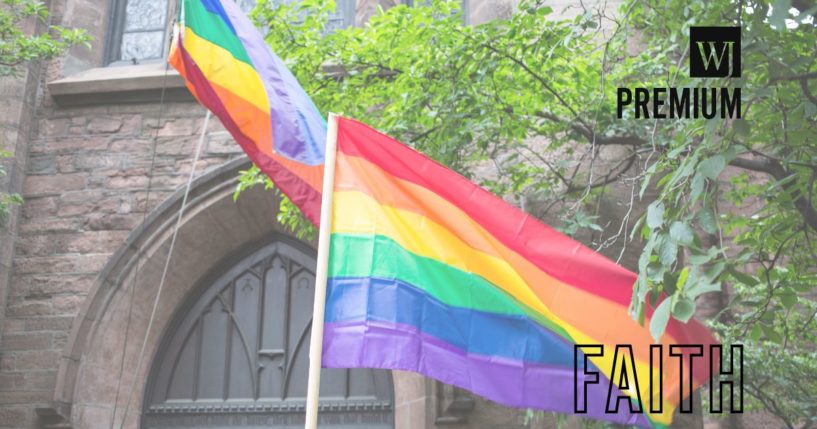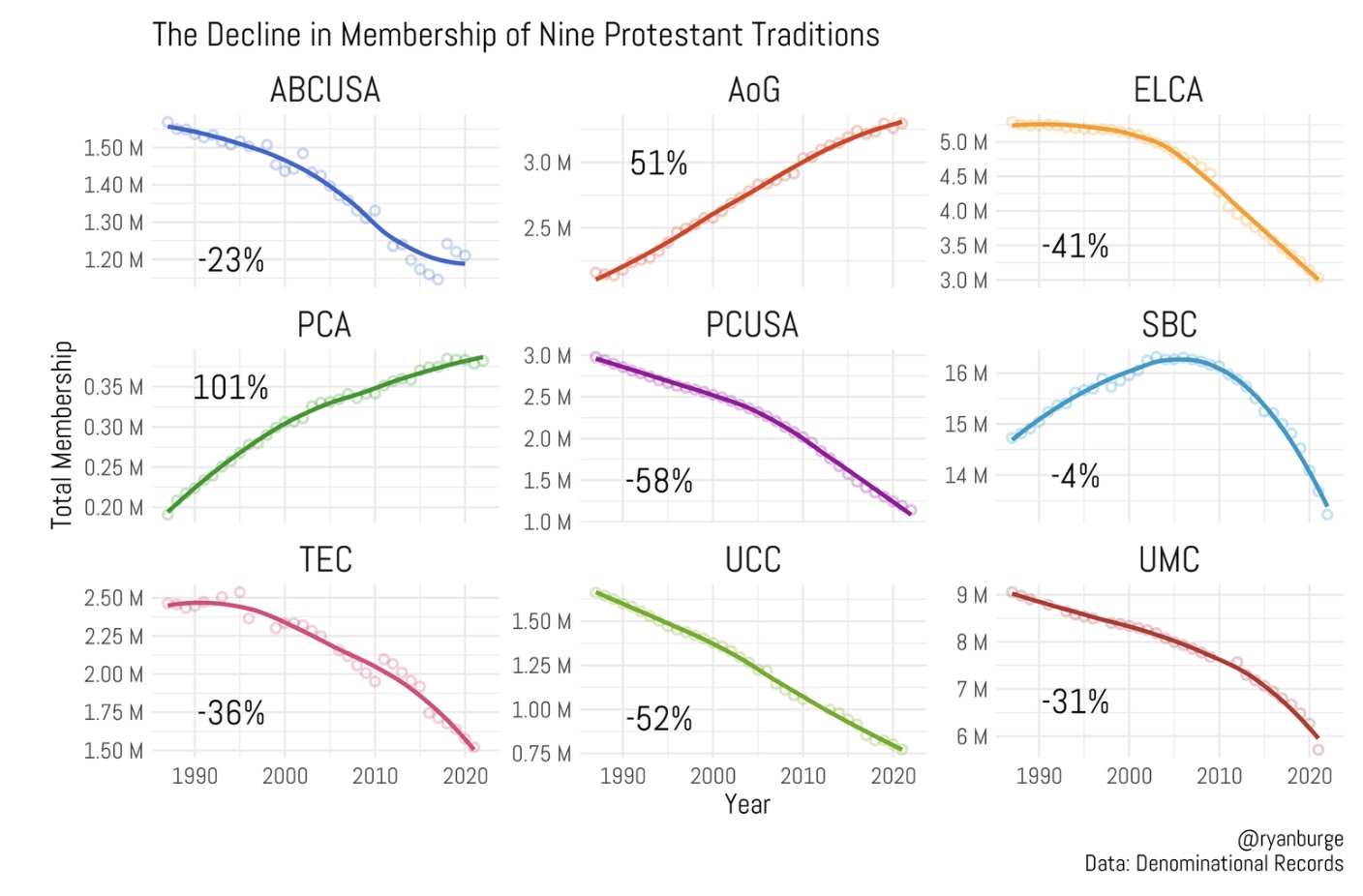
Denomination or Abomination? – The Rise of Heresy in Mainline Christianity
On a detached city block in Boston, Massachusetts, on the corner of Dartmouth and St. James sits the Episcopal parish of Trinity Church.
The structure is a marvel, the very first of the “Richardsonian Romanesque” style, combining early medieval and Romanesque elements. The magnificent parish was built in 1872 to replace the original structure that was lost in the Great Boston Fire.
Trinity Church has been worshipping as a congregation since 1728. It would have been the hub for Bostonian Anglicans when King’s Chapel was abandoned during the Revolutionary War; even George Washington attended briefly, in 1789.
But the building is now frequently adorned with LGBT flags, Black Lives Matter paraphernalia and pro-illegal-immigrant propaganda. A parish that once proclaimed the gospel from an incredible church — itself an act of worship — now hosts services of the apostate Episcopal denomination.
The Episcopalians have led the way into vile degeneracy for American Protestants, with bishops as far back as the 1960s denying the virgin birth, and open homosexuals being ordained to the clergy as far back as the 1970s.
Protestant-wide Apostasy
The Episcopalians are not alone in their apostasy, however. The United Methodist Church (UMC) voted this week to lift its ban on LGBT clergy and homosexual “marriages.”
This decision has been several years coming. The debate over the issue at their 2019 global meeting resulted in an enormous exodus from the denomination, which has lost over one-quarter of affiliated congregations in the years since.
The Evangelical Lutheran Church in America (ELCA), the Reformed Church in America (RCA) and the Presbyterian Church (PCUSA) beat the UMC to the punch with their current (some longstanding) affirmation of homosexual, progressive worldviews.
This means Trinity Church in Boston is just one of the many thousands of historical churches in America owned and operated by Protestant denominations that have fallen, utterly, from their orthodox roots.
You can’t walk through a major city in the U.S. without spotting classic, beautiful church architecture adorned with anti-Christ imagery and slogans. Palaces that once stood as living testaments to the glory of God and the grandeur of Christ now mock the Lord as synagogues of Satan.
Apostasy Isn’t Popular
As heresy rises in mainline American denominations, membership seems to correspondingly decrease:

The Assemblies of God (AoG) — a Christ-centered, God-fearing Pentecostal denomination — is one of the few “mainline” denominations to see growth over the last few decades, along with the Presbyterian Church in America — a schism of the PCUSA that upholds orthodox, conservative doctrine.
However, the AoG itself operates more as a non-denominational church network than it does a traditional, mainline Protestant denomination, meaning there really is only one significant mainline denomination in the United States that isn’t itself in a death spiral.
But the PCA can hardly be considered as a case study in success, as their membership hovers around a meager 400,000.
Non-denominational Christianity, on the other hand, has exploded. Between 2010 and 2020, non-denominational attendance has grown by 6.5 million with 4,000 new churches. That Christians are fleeing heretical church leadership and seeking Biblical teaching seems to be an argument that makes itself. Is that the case?
Not Just a Protestant Problem
Catholicism in America isn’t faring much better than mainline Protestant denominations. Since the 1970s, mass attendance has decreased by 50 percent. The Catholic Church in the U.S. has lost millions of members, and it isn’t replacing them fast enough.
Eastern Orthodoxy is also struggling. While data is harder to compile due to its more diverse and schismatic nature, what we do have points to a dramatic decline in membership in the last 100 years.
This information adds a dimension to the conversation. Despite recent controversy surrounding Pope Francis, the Roman Catholic Church has remained by and large a bastion of conservative theology, and Eastern Orthodoxy doubly so. And yet they’re both seeing declines in membership in the U.S., similar to the mainline Protestant denominations.
And it’s not as if you can draw a direct relationship between the former membership of mainline denominations and the new membership of the amorphous non-denominational sect. Mainline denominations lost around 19 million members from 2000-2020 — add to that the millions of former Catholics and Orthodox.
Non-denominational Christianity has certainly not picked up all of them. This means millions of Americans didn’t just leave organized religion or the high churches, they left the faith. So what’s to blame?
Individualism is Killing Christianity
What the United States boasts more of than any other nation in the world is individualism. It’s lauded here as a virtue. We are all CEOs of our own lives, charting our own American dreams.
This has largely bled into theology, as the phrase “relationship not religion” has pervaded Christian conversations quite frequently in recent years. The COVID-19 “pandemic” only made it worse, when we heard over and over that “church isn’t a building,” and there is no problem conducting your worship in near-total isolation.
The problem with American individualism bleeding into our theology is that it is an inherently self-centered ethos in a religion that is inherently self-debasing. Additionally, Christian orthopraxy requires a submission to and reverence of local, ordained human authority.
Churches livestreaming into living rooms isolates one from ecclesiastical accountability, and the deprivation of the local gathering eliminates the opportunity to serve one another in any selfless way.
Americans want to do things our own way, on our own terms, in our own time. By nature and pedigree, we don’t like being told what to do, and are skeptical of authority. While this has certainly led to a nation passionate about personal liberty, it has led to a church of believers rebellious to sovereignty.
Christianity is a Religion
“And they devoted themselves to the apostles’ teaching and the fellowship, to the breaking of bread and the prayers. […] And all who believed were together and had all things in common. And they were selling their possessions and belongings and distributing the proceeds to all, as any had need.” (Acts 2:42, 44-45)
It’s ironic that many non-denominational Christians will point to “the church of Acts” as their proof texts for avoiding organized religion and opting for a more choose-your-own-adventure faith. And I say this as an American non-denominational Protestant.
We’ll reject liturgies and priestly vestments, citing their absence from scripture. But we’ll also reject personal charity and submission to our local church authority, which are clear and present in scripture.
Instead of devoting ourselves to the leadership of our pastors and fellowship with our fellow parishioners, we’ll pick and choose what teaching we obey, switching churches on a whim with no consequences as soon as our pastor gets a little too in our business.
This kind of personal freedom is unique to non-denominational Christianity. Non-denominational churches seem to operate to provide a service to the public once a week, rather than operating to gather and protect a close-knit community of local believers.
They’re often far more like Christian-themed convenience stores — indistinguishable, interchangeable and universal.
And while there are many, many non-denominational churches preaching the true Gospel and standing against the evil in our culture, they do this in spite of their individualism, not because of it.
Individualism is wormwood. It’s poison to the Christian and poison to a Biblical worldview. This case can be closed after examining the membership of the organized high-church sects worldwide, as opposed to exclusively in America:
Roman Catholicism has recently grown by 1.8 percent in Asia and 2.1 percent in Africa, two regions of the world with cultures that are almost completely absent of any kind of individualism.
Catholicism has also grown by .3 percent in Europe and, while I don’t have the data to confirm this, I would wager this .3 percent figure is split between actually much larger growth in Eastern Europe and a net-negative loss of membership in the individualistic West.
Eastern Orthodoxy has seen an explosion of growth in Africa in recent years, and of the 19 nations in the world with more than one million Orthodox, only two are in the West.
I fear that within my lifetime, America will lose its position as a home for influential theological significance. I fear that in our quest for liberty and the pursuit of our happiness, we have selfishly placed prideful ambition in front of humble, submissive service.
Like the ancient nation of Israel, we have gone astray and only done what is right in our own eyes. But, unlike the ancient nation of Israel, America has no covenant with God to guarantee her survival.
Truth and Accuracy
We are committed to truth and accuracy in all of our journalism. Read our editorial standards.
Advertise with The Western Journal and reach millions of highly engaged readers, while supporting our work. Advertise Today.












